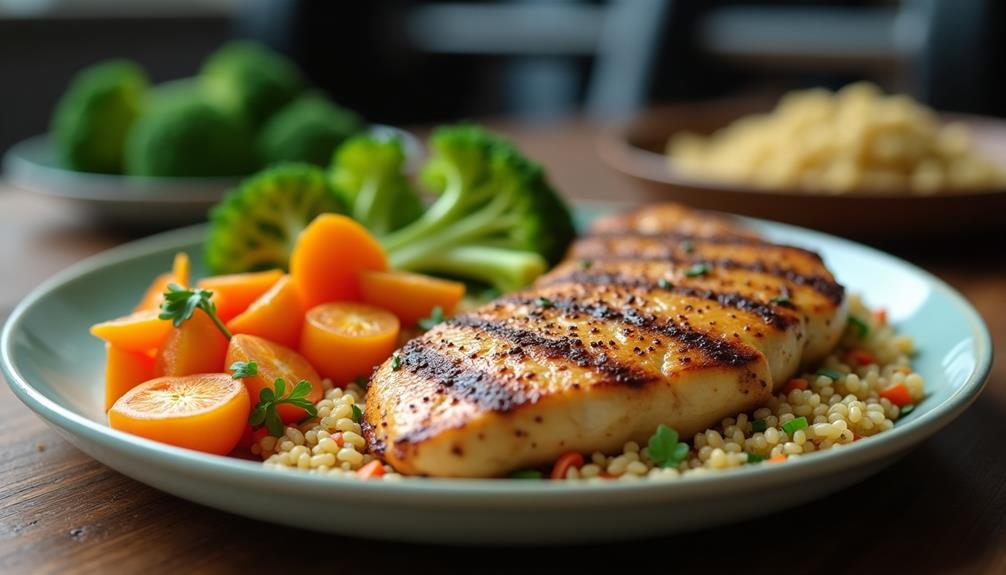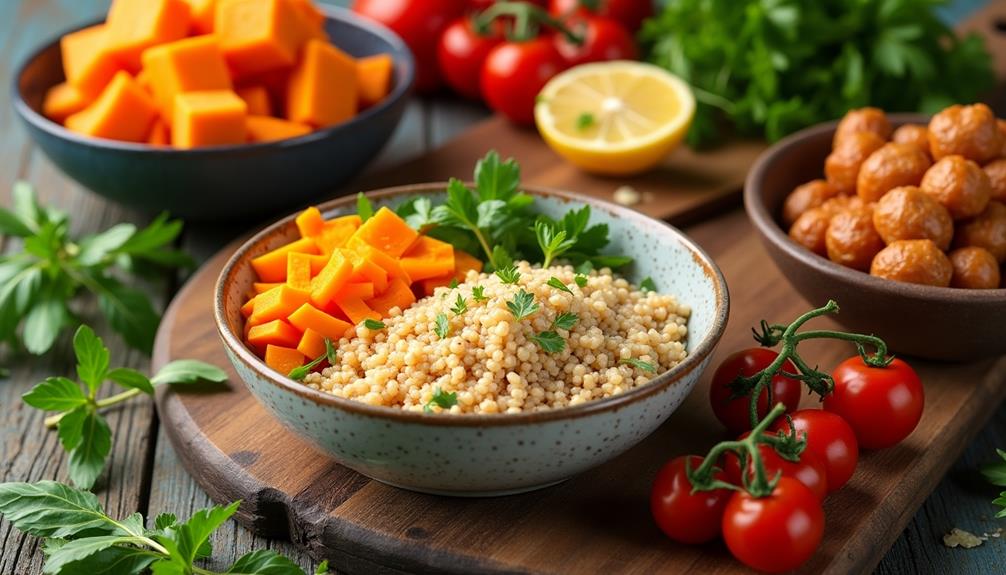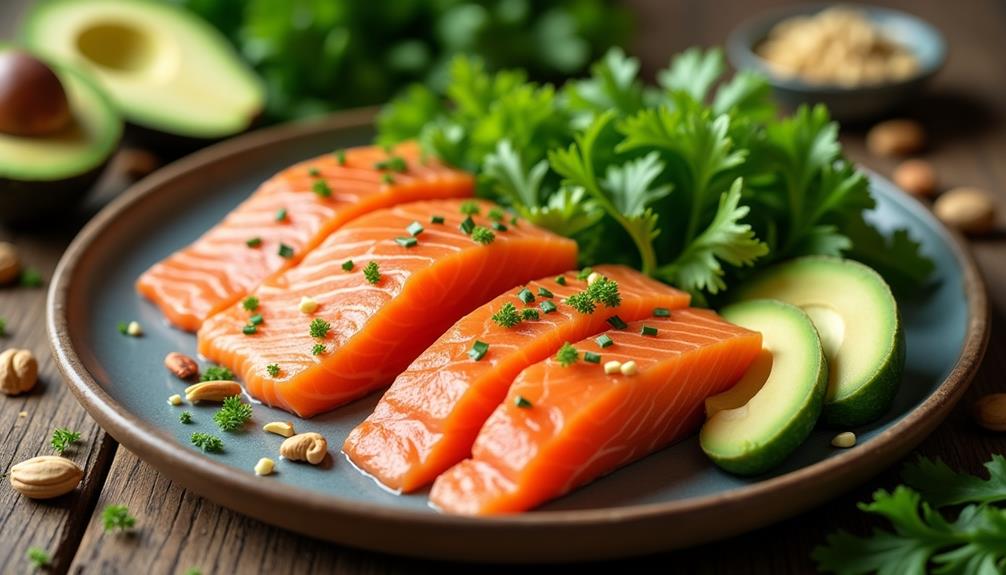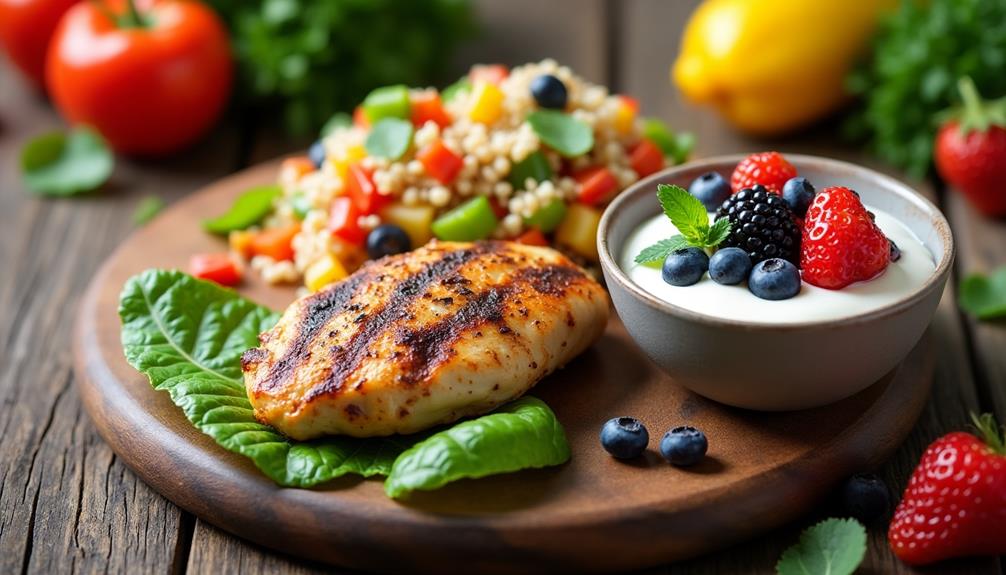When it comes to muscle repair for strength athletes, focusing on the right foods is crucial. First, lean protein sources like turkey breast or Icelandic yogurt provide essential amino acids that help rebuild muscle. Second, nutrient-dense carbohydrates such as yams or quinoa offer the energy you need while supporting recovery. Finally, healthy fats, particularly from oily fish like mackerel or chia seeds, can enhance muscle repair and reduce recovery time. Incorporating these foods into your diet ensures you're fueling your body effectively, setting you up for success in your training and recovery journey. There's more to explore about optimal nutrition that can benefit your routine.
Core Insights
- Chicken breast is a top choice for muscle repair due to its high-quality, low-fat protein content essential for recovery.
- Greek yogurt offers both protein and probiotics, supporting muscle repair and gut health after intense training.
- Fatty fish, rich in omega-3s, can significantly enhance muscle recovery times and reduce inflammation.
- Quinoa provides a combination of protein and complex carbohydrates, replenishing energy stores and aiding recovery.
- Eggs are a nutrient-dense source of high-quality protein, supporting muscle repair and overall health for strength athletes.
Lean Protein Sources

When it comes to muscle repair, incorporating lean protein sources into your diet is crucial. Lean proteins, like chicken breast, turkey, and fish, provide the amino acids your muscles need to recover and grow. These proteins are low in saturated fat, making them healthier options for your overall nutrition. For best results, consider supplementing with high-quality protein powders that offer 20-30g of protein per serving and contain complete amino acid profiles.
Eggs are another excellent choice. They contain high-quality protein and essential nutrients that support muscle recovery. Greek yogurt also deserves a mention; it's packed with protein and probiotics, promoting gut health.
Aim for a variety of these sources to ensure you're receiving a balanced intake. By prioritizing lean proteins, you're establishing a strong foundation for effective muscle repair and enhancing your strength training results.
Nutrient-Dense Carbohydrates

Fueling your workouts effectively requires including nutrient-rich carbohydrates in your diet. These carbs provide the energy you need to power through intense training sessions. Focus on whole, unprocessed sources like sweet potatoes, quinoa, and brown rice. These foods are rich in vitamins and minerals, which support overall health and recovery. For top-notch post-workout replenishment, consider incorporating fast-acting carbohydrates in powder form to rapidly restore glycogen levels and enhance recovery.
Include fruits like bananas and berries, as they offer natural sugars and antioxidants that help combat inflammation. Don't forget legumes, such as lentils and chickpeas, which not only provide carbs but also add fiber and protein to your meals.
Healthy Fats and Omega-3s

Incorporating these healthy fats into your diet can improve recovery times and enhance your overall performance. Best healthy fats can greatly enhance muscle gain and repair when consumed regularly. Aim for two servings of fatty fish per week or add a tablespoon of flaxseeds to your smoothies. Remember, balance is key, so combine omega-3s with other nutrients for best results. By prioritizing healthy fats, you'll give your muscles the support they need to recover effectively.
Frequently Asked Questions
How Much Protein Is Needed for Optimal Muscle Repair?
To optimize muscle repair, you need about 1.6 to 2.2 grams of protein per kilogram of body weight daily. Adjust this based on your activity level and specific training goals for best results.
When Is the Best Time to Consume Post-Workout Nutrition?
Right after your workout, your muscles crave nutrients. Consuming post-workout nutrition within 30 minutes helps maximize recovery. It's when your body's primed to rebuild, so don't miss that essential window to fuel your gains!
Are Supplements Necessary for Muscle Repair?
Supplements aren't strictly necessary for muscle repair. You can often get what you need from whole foods. Focusing on a balanced diet rich in nutrients typically supports your recovery just as effectively.
Can Hydration Impact Muscle Recovery?
Absolutely, hydration plays an essential role in muscle recovery. When you stay well-hydrated, your body efficiently transports nutrients to muscles, reduces soreness, and helps prevent cramps, making it easier for you to bounce back after workouts.
What Role Does Sleep Play in Muscle Repair?
Sleep is essential for muscle repair because it's during deep sleep that your body releases growth hormones. Prioritizing quality sleep helps your muscles recover, rebuild, and grow stronger, ultimately enhancing your performance and reducing injury risk.

